RIP Robbie Robertson
To pay tribute on the news of his passing at age 80, I present my 2019 interview with the Band guitarist, in two parts.
It’s highly unusual for me to make two posts on this site in this same day, but extreme circumstance call for extreme actions. I was so sad to hear about the passing today of The Band guitarist Robbie Robertson at 80 and didn’t want to let that go by without marking it. The man was not without his controversies but his songwriting and guitar playing were epochal to the music I - and most of you - love so much. This is covered in Brothers and Sisters: the Allman Brothers Band and The Album That Defined The 70s, where the Band, not only appear int he section on the Summer Jam at Watkins Glen, where they were the “third band” between the Grateful Dead and Allman Brothers Band , but also as major influence on the Dead and the broader music world:
BY THE TIME the Allman Brothers Band formed in 1969, the Dead was coming out of its heavy psychedelic phase and headed toward the emerging Americana of Workingman’s Dead and American Beauty. The two song-oriented, country-tinged albums were released within five months of each other in 1970 and are the pinnacle of the band’s studio career. The tunes reveal the heavy influence of the Band’s first two releases, which made a huge impact on Garcia and lyricist Robert Hunter, the Dead’s primary songwriters. {Due to a production error, this reads “the Allman Brothers Band” in some early printings of the book, but what’s here is correct!]
I interviewed Robbie in 2019 for the WSJ’s Weekend Confidential story and had so much good stuff left over that I did a Q and A for Guitar World. I’m just going to present them both here, back to back.
From the Wall Street Journal. September 20, 2019
Robbie Robertson lets out a wistful laugh as he recalls the experience of playing slashing electric guitar leads behind Bob Dylan on Mr. Dylan’s tours in 1965-66. Hundreds of thousands of fans packed sold-out arenas to energetically boo their idol’s turn away from his trademark solo acoustic performances. From this difficult and galvanizing experience, the group that backed Mr. Dylan—including Mr. Robertson—emerged and became The Band.
After moving to Woodstock, N.Y., living collectively, and writing and rehearsing for two years, The Band made its debut with “Music From Big Pink,” offering a singular artistic voice laced with country, blues and Americana. Most of the group’s material was written by Mr. Robertson, and The Band’s first two albums included some of rock’s most original, indelible songs, including “The Night They Drove Old Dixie Down,” “Up on Cripple Creek” and “The Weight.” The songs combine vivid imagery with a touch of impressionism; they sound both utterly original and like folk songs that have been passed down for generations.
How did Mr. Robertson craft these vignettes? “It was my job, and I took it very seriously,” he says.
He is still working the same job. Now 76, Mr. Robertson has an array of projects lined up. “Sinematic,” his first album since 2011, was released on Sept. 20. A deluxe edition of The Band’s second, eponymous album will come out later this fall, celebrating the 50th anniversary of its release. “Once Were Brothers: Robbie Robertson and The Band,” a documentary based on his 2016 memoir “Testimony,” made its debut at the Toronto International Film Festival earlier this month and was picked up for theatrical release in 2020. And his soundtrack for Martin Scorsese’s “The Irishman,” a gangster saga, will get its first public airing at the New York Film Festival on Sept. 27. It is the 10th movie by the director that Mr. Robertson has scored.
“Every movie that I’ve worked on with Marty has been a completely different experience,” says Mr. Robertson. “That’s what’s so exciting about what we do together. He always says, ‘As long as it doesn’t sound like movie music.’ That eliminates a lot.”
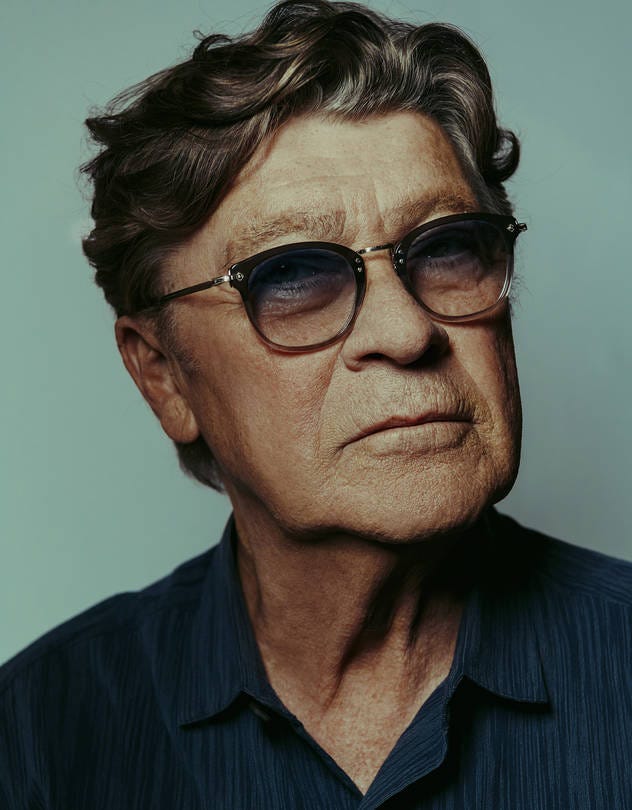
Mr. Robertson was deeply inspired by cinema long before he ever worked on a film. “I was a lifelong movie nut, and my real writing breakthrough came when [the poet] Gregory Corso and I were both living in New York’s Chelsea Hotel and he told me about the Gotham Book Mart, where I could buy the scripts of Akira Kurosawa, Howard Hawks, John Ford and Orson Welles, ” says Mr. Robertson. “Oh my God! They revealed so much and completely altered my songwriting.”
In 1968, “Music From Big Pink” had an immediate impact. Eric Clapton has said that he broke up his landmark psychedelic blues band Cream immediately after hearing the album, and he traveled to Woodstock to meet Mr. Robertson and his bandmates. (Mr. Clapton later said that he had intended to ask whether he could join the group but never got around to it.) George Harrison and his then-wife, Pattie Boyd, also trekked up to meet The Band.
“I knew the album was good and that it was different, but I was surprised by the impact on people like Clapton and the Beatles,” Mr. Robertson says. “We were together for six or seven years honing our skills, learning our craft and gathering music—gospel, blues, mountain music, sacred harp singing, Anglican hymns—before we made an album. We went out in search of a sound and put everything in our big pot of gumbo.”
The sound on “Sinematic” is atmospheric, living up to its deliberately misspelled title. The first two songs were directly inspired by Mr. Robertson’s two recent film projects. The title of “I Hear You Paint Houses” (a duet with Van Morrison ) is heard in “The Irishman”: It is a mob expression for being a hit man, hinting at gory work. “Once Were Brothers” was written for the documentary of the same title.
The song and the film are the first times Mr. Robertson’s art has directly addressed the sadness at the heart of The Band’s disunion. His former bandmates expressed ever more bitterness toward Mr. Robertson after he left the group in 1976 for a career on his own. (The Band’s farewell concert in San Francisco was turned into a live album and a landmark 1978 movie, “The Last Waltz,” by Mr. Scorsese.)
There was anger over Mr. Robertson’s many solo songwriting credits for The Band, which allowed him to reap more royalties, and his decision to leave the group in its prime. Richard Manuel, Rick Danko and Levon Helm are now dead, leaving only Mr. Robertson and Garth Hudson, who played several instruments. Helm, an Arkansas native who gave voice to many of the Canadian Mr. Robertson’s strikingly empathetic portraits of the American South, was particularly outspoken in his bitterness.
‘I just started thinking about how I’ve lost Richard, Rick and Levon, and it’s heartbreaking.’
“I didn’t set out to write about this, but I just started thinking about how I’ve lost Richard, Rick and Levon, and it’s heartbreaking,” says Mr. Robertson. “The song took me where it wanted to go. And it came naturally in telling the story in the film, which leans heavy on the very real brotherhood.”
Mr. Robertson still feels the rupture keenly. “Levon and I were so close, and he was the closest thing to a real brother I’ve ever had, so there was an emotional power in telling what happened,” he says. “It was painful for me when he started saying things about me—because I knew that he was going through hard times that were eating him up, and the things he said were a reflection of his hurt. He said that I was responsible for The Band not coming back together again. And there was a truth in that, but I would have done it if it was doable.”
FROM GUITAR WORLD
The Band’s 1968 debut album, Music from Big Pink, was such a bolt of originality - creating what came to be known as Americana - that it reverberated throughout the rock world. Eric Clapton said he broke up Cream immediately after hearing it and even trekked to Woodstock, New York, to meet its makers, as did George Harrison.
“I knew the album was good and different, but I was surprised by the impact on people like Clapton and the Beatles,” guitarist and songwriter Robbie Robertson says, 51 years later. “We were together for six or seven years before we recorded our debut, honing our skills, learning our craft and gathering music - gospel, blues, mountain music, sacred harp singing, Anglican hymns.
We were putting everything in our big pot of gumbo, and when we made a record sounding like that, all these guys asked, ‘Where the hell did this come from?’ That’s what happens when you really go out in search of a sound.
“We were bringing a musicality that wasn’t already there. So there was a freshness and newness to it. And it opened up some people’s ears. They really thought it was coming from another world - and it was, in a way.”
Robertson is Canadian, as were all of his Band-mates, with the notable exception of the Arkansas native Levon Helm, the drummer/singer who was also a big brother and musical guidepost for the rest of the group.
The Band first came together backing rockabilly singer Ronnie Hawkins, did an intensive internship as Bob Dylan’s first electric band in 1965-66, then emerged as a singular artistic voice, creating rock laced with country, blues and other folk music.
They were built around three remarkable singers - Helm, bassist Rick Danko and pianist Richard Manuel - and a fantastic batch of songs, most of them penned by Robertson, the band’s slashing lead guitarist. He wrote some of rock’s most original, indelible songs, including “The Night They Drove Old Dixie Down,” “Up On Cripple Creek” and “The Weight.”
The songs, which were given more depth by multi-instrumentalist Garth Hudson, sound utterly original and like folk songs that have been passed down for generations. They are so superb that Robertson’s excellent guitar playing is often overlooked.
Robertson is now 76 and still a vital creative force, with a host of new projects. Sinematic, his first album since 2011, was released in September. A deluxe edition of The Band’s second (eponymous) album celebrated that landmark work’s 50th anniversary.
Once Were Brothers: Robbie Robertson and the Band, a documentary based on his 2016 memoir Testimony, debuted at the Toronto Film Festival last fall and was picked up for theatrical release in 2020. And Martin Scorsese’s The Irishman was the 10th movie by the director which Robertson has scored.
We recently caught up with the busy Robertson to discuss all of the above and a whole lot more.
You became renowned for your songwriting, but you established yourself first as a really hot guitarist. The clips in Once Were Brothers: Robbie Robertson and the Band illustrate how your vibrato is so distinct, even from those early Ronnie Hawkins clips. Who were your biggest influences?
When I was 16, I went from Toronto to the Mississippi Delta with Ronnie, and we went to this record store in Memphis, the musical center of the universe. It was like walking into a reservoir of sound, and I spent almost my whole paycheck on records. The sound of Hubert Sumlin’s guitar on Howlin Wolf’s I Asked for Water and She Gave Me Gasoline and Evil… man!
And it was Muddy Waters, Robert Johnson, B.B. King, all the acoustic guys. Hearing them and their great vibratos made me determined to figure out how to do that. And one of the things nobody knew about on a large scale yet outside the South was this trick of using a banjo string for the first string, then moving the others all down one. That way the strings were looser, and you could bend them.
I learned it from Fred Carter, who was the guitar player I took over from. He was from Louisiana and a lot of guitar players came through the Louisiana Hayride [radio and TV show]: guys like James Burton and Roy Buchanan. I was learning the tricks of the trade and that was my school. Ronnie recognized that there was no stopping me and said, 'Go get ’em, kid.'
Roy Buchanan was briefly your bandmate; he seems to have already been an immense and quirky talent.
He was amazing. A lot of people didn’t understand Roy and thought he was weird, but I really liked him, and he was very generous. A lot of guitar players displayed jealousy and wouldn’t show you things: 'I had to learn myself - and so do you.' He wasn’t like that.
He’d show me something on his guitar, then hand it to me, but I couldn’t play his guitar! The strings were an inch off the fretboard, and I didn’t even know how he played that thing, but it just sang beautifully when he put his fingers on it."
He sure doesn't sound like someone with a super high action!
I know. I didn't understand that. But when I picked up as guitar it was like, "I don't know how the hell did you play this thing?" And people told me the same thing about Stevie Ray Vaughan, that his guitar only he could play his guitar.
You were 16 when you hit the road with Ronnie, a child prodigy of sorts.
It was part of the workshop, paying your dues, learning your craft. I knew I had to do this with everything I’d got because Ronnie had an incredible, tight, driving rockabilly band, who didn’t even have bass! He made me the bass player to help acclimate me to the music and prepare to replace Fred, and I wanted to to be a part of it.
I was thinking, 'Holy shit, how in the world am I going to impress these guys?' I’m inexperienced and don’t know how to play well enough, but boy, I wanted it and went on a crash course to learn. The bottom line was, there were no Canadians in a Southern rock and roll band.
And not just a Canadian - but a 16-year-old Native Canadian/Jewish kid.
Right! I had the break down all these barriers to win, and it was such a challenge. I had obstacles to overcome that were a mile long.
If the early road was your school, what was touring with Bob Dylan in 1965 and ’66, with all those incredible shows with people virtually assaulting you as he rewrote musical history?
It was a deep education on the magic of music and life. You couldn’t have written a more amazing story, and that forged the Band. The shit we went through was incredible. Hooking up with Bob Dylan was like entering The Twilight Zone of music. You thought, 'They’re going to wake me up tomorrow because all of this is impossible.'
There’s an interesting clip in the film where you climb in the back of the limo after one of those shows where you’ve been assaulted with boos, and Bob says, “Well, why did they buy the tickets so fast?” That is such an interesting dynamic where the shows are so in demand yet so attacked.
Everything was sold out! I don’t believe in history there is an equivalent story that somebody tours all over North America, Australia and Europe, and every night they boo you around the world. They’re booing this guy who revolutionized music, and we’re part of the revolution. I don’t know if this has ever happened to anybody in history. What a strange way to make a buck.
How did it impact you when you suddenly learned that your father was not your father? You’re living part time on a reservation and find out that you had a whole other family of Jewish mobsters in Toronto.
And those two worlds never connected. But when my mother told me this, it was so unimaginable that I had to take it in stride because I thought, “I just can’t freak myself out with this information.” It was a lesson about growing up: anything can happen, and you’ve got to stay standing. I just had to accept it because it was the truth.
Did the native part of your ancestry play a big role in your music?
I got introduced to music on a real level on the reservation, and it was part of that culture and heritage. Everybody played music and I needed to be in the club, so they said, 'Well, what instrument? Do you want to play a mandolin or fiddle or drums?' I said, 'I like the look of that guitar.'
My mom got me a guitar with a cowboy painted on it. And I thought it was so ironic that I have a guitar with a cowboy on it and Indians are teaching me how to play.
You really had that thought even at that young age?
I did, because it was right in front of me. And one of the reasons I’m sure that the guitar appealed to me so much was seeing movies with cowboys like Gene Autry and Roy Rogers playing.
One of the things that's striking in your book is how often you're constantly coming across these incredible figures from Jimi Hendrix to Salvador Dali, from the Beatles to Andy Warhol and from Marlon Brandoto Sonny Boy Williamson, Were you aware in the moment sort of how extraordinary it was that you found yourself in the middle of so much?
There were moments when you would stop and say, "We're going to Salvador Dali's? Wow!" But I was always better off not making too big a thing out of it . I was afraid they might tell me, "No, maybe you shouldn't come." I had to act like this is business as usual; "It'd be great to see Brando this afternoon
On the song “Once Were Brothers” on the new album, some of the background vocals and rhythms have a native echo.
That happens quite often. It’s just there; it lives inside me."
Am I right in saying that it’s the first time you’ve directly addressed the sadness at the end of the Band in a song?
It definitely is. As usual, I didn’t know what I was going to write about, and it just started going down that path, and just thinking that I’ve lost Richard and Rick and Levon, and it’s heartbreaking to me. I couldn’t help for it to come out in the music and in the story I was telling.
The movie addresses Levon’s anger with you and the difficulties in that relationship, which you haven’t discussed too much.
It just came about naturally because we were really leaning on the very real story of the brotherhood. Levon and I were the closest; he was the closest thing to a real brother I ever had.
Did that make the difficulties that much more painful?
Yes. It was painful to know what he was going through and that it was eating him up - and it had nothing to do with me. He’s a tremendous guy and a tremendous talent, somebody that I loved so much.
When Levon said these things, I thought, “Oh, he’s having a tough time.” And I never engaged in it at all, because I knew there was something else going on, and then I found out he had health and financial problems.
I still completely loved him. Years later, he suddenly said I was responsible for The Band not coming back together. There was a truth in that, that I completely admit to - but I would have done it if it was doable. I was the only one that showed up.
What do you mean?
After The Last Waltz, we wanted to talk about what we were going to do when we come back after everybody pursued some other things. We were going to meet at the studio, and I went there and nobody came or answered their phone.
I sat there and waited, and it got dark outside and I thought, 'I’ve got to read the writing on the wall.' It was just a sign that everybody wanted to go in a different direction, and I was like, 'Okay, I get it.' And that was it. I showed up and I guess they would have if they could have.
The Irishman is your 10th soundtrack working for the same director - what is it about Scorsese that inspires you?
Is it that many? With Marty, every movie I’ve worked on has been a completely different experience. That’s what’s so exciting about what we do together, and it doesn’t get easier because, just before I start figuring out what I’m going to do on a movie, he says, “As long as it doesn’t sound like movie music.”
Your album is called Sinematic, and you attribute your songwriting breakthrough to reading and studying screenplays and scripts. Can you describe how that came about?
I became a movie bug when I was quite young. And even in the early days of playing with Ronnie, everybody would be laying around in the afternoons. I would go and see a movie and come back from Fellini so inspired and try to describe it, and everyone else’s eyes just glazed over. They thought I probably needed medical help. But I couldn’t help being so drawn to this.
Even at eight years old I remember going to see movies and just living inside them. It just touched a nerve deep inside me. And eventually I wondered how they did that and [poet] Gregory Corso, who was living at the Chelsea Hotel the same time I was, told me about a place called Gotham Bookmark where you could buy the scripts of Akira Kurosawa, Howard Hawks, John Ford and Orson Welles.
"Oh, my God. They revealed something to me that was very valuable and inspired me to write the stories in songs."
Didn’t playing all those shows with Dylan impact your writing? Did you study his songs in a scientific way?
No, but they were right in front of me and I had to play them every night. He was a really close buddy of mine doing something nobody had done before. He broke down some of these walls of songs that were all about the same thing. He wrote about different things in a different way - in a different language.
Oh, my God. There was a tremendous sense of freedom from what Bob uncovered and revealed to the world. It was like, there are no rules. Even years later when I started making solo records I found I was almost scoring the songs as opposed to strumming along or picking a little riff behind it. It was almost like it was going to be a sonic experience and that’s continued.
How did Derek Trucks come to be on Sinematic?
The last piece of music on the album, Remembrance, that I wrote in memory of my buddy, Paul Allen. That's a piece of music that's in the movie The Irishman. And so when he passed away and I thought how can we pay an homage in some kind of way. So I just called Derek right away and then I called Doyle because I hooked Doyle up with Paul and he helped Paul make some music, and I just thought... he loved the way that Doyle played and love the way that Derek played and the way that I played. So it was a perfect way for us all to kind of deal with our sadness in it. And Derek is just... I don't know. He might be the best slide player in the world.
My fourth book, Brothers and Sisters: the Allman Brothers Band and The Album That Defined The 70s, was published on July 25th. It was the third straight instant New York Times bestseller, following Texas Flood: The Inside Story of Stevie Ray Vaughan and One Way Out: The Inside History of the Allman Brothers Band. My first book was Big in China: My Unlikely Adventures Raising a Family, Playing the Blues and Becoming a Star in Beijing, about his experiences raising a family in Beijing and touring China with a popular original blues band. It was optioned for a movie by Ivan Reitman’s Montecito Productions. I am also a guitarist and singer who fronts two bands, Big in China and Friends of the Brothers, the premier celebration of the Allman Brothers Band.



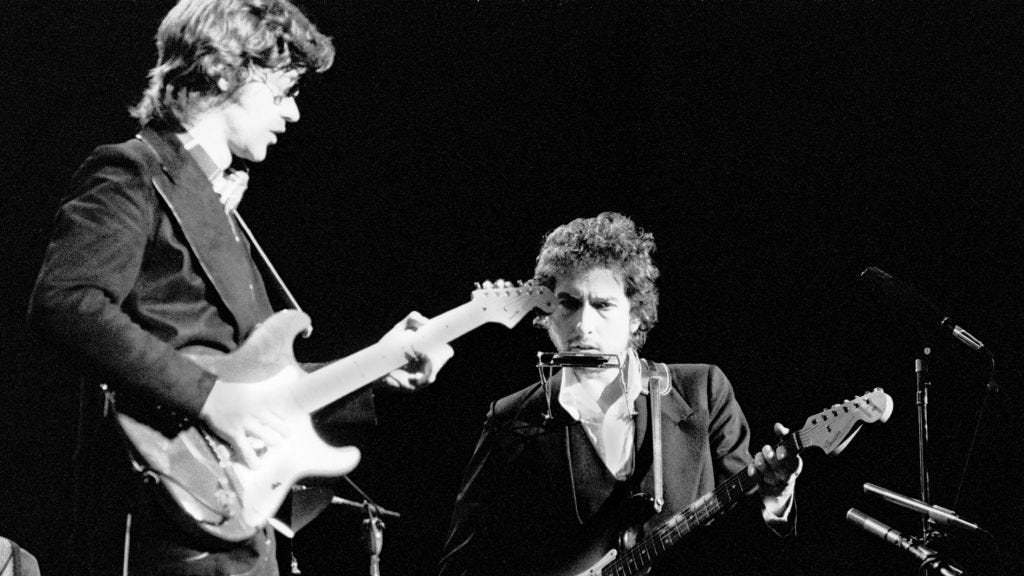
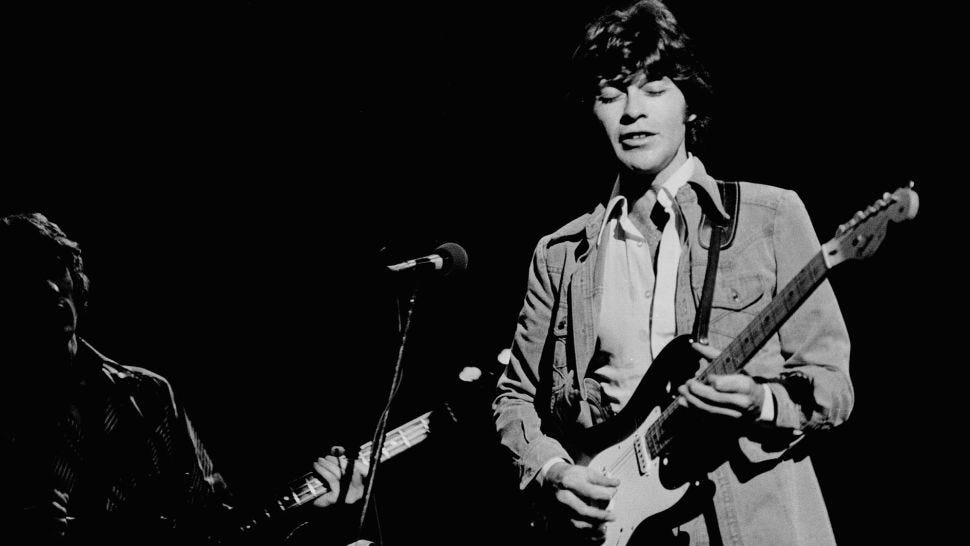
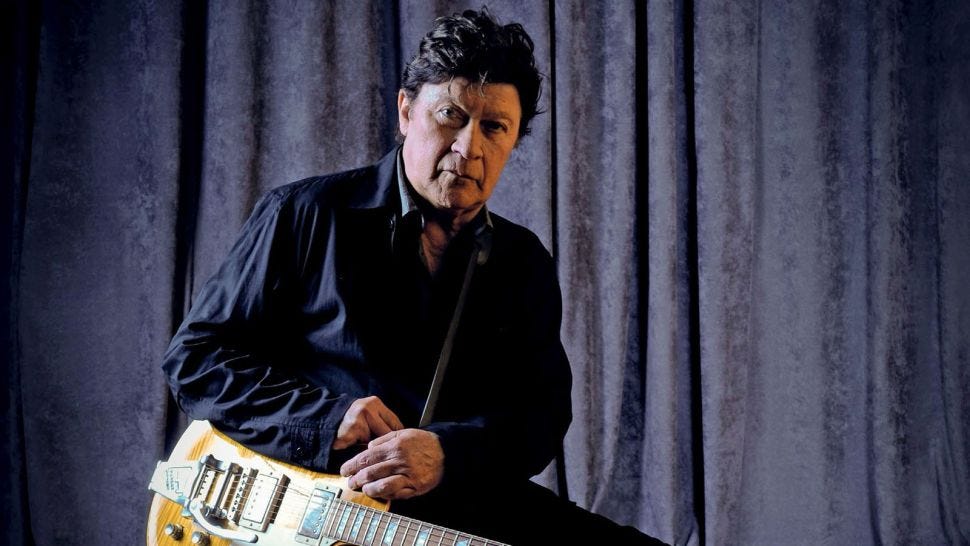
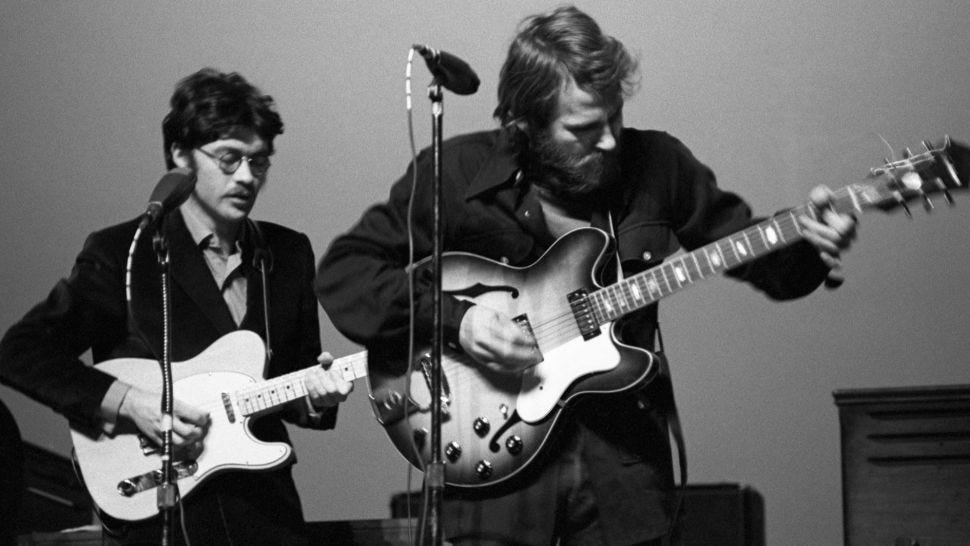
How is it,you wrote for WSJ & Jam in Beijing and play music...oh,my bad..AMER-I-CAN....Don't believe it go to Piedras Negra and Eagle Pass...and see which side has people lined up to come in....like Robbie Robertson, Canadian & Complex... good stuff Alan.
A sad day in music. Robbie’s musical legacy will live on. Rest in Peace